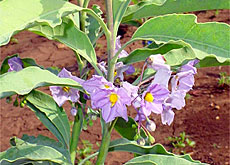Herbonis, based near Basel, already has approval in Switzerland to develop a product for boosting bone growth in animals.
After cardiovascular disease, osteoporosis is the second most prevalent medical problem in the world.
 But Herbonis believes it may have found a solution in the plant solanum glaucophyllum or waxyleaf nightshade.
But Herbonis believes it may have found a solution in the plant solanum glaucophyllum or waxyleaf nightshade.
“It has very favourable properties, as we have already found in animal studies,” chief executive Beat Glatthaar told swissinfo.
Active ingredient
Herbonis has identified a powerful compound in the waxyleaf nightshade that helps the body to absorb calcium from food, building strong bones.
Inadequate calcium is thought to contribute to the development of osteoporosis.
Worldwide, 30-40 per cent of women suffer a fracture because of osteoporosis. In men, the risk is about 13 per cent.
In several European countries, it is responsible for more hospital stays for women over 45 than any other disease.
Recent studies have forecast that the global market for osteoporosis treatment will triple over the next ten years and be worth about SFr12.5 billion ($9.8 billion) by 2011.
New bone-building agents, which are now becoming available or are in the development pipeline, are expected to capture 29 per cent of the total market.
“This is exactly the area where Herbonis wants to become active,” said Glatthaar.
Calcium deficiency
Before its product is approved for humans, Herbonis anticipates its use in poultry.
In today’s intensive breeding programmes, chickens are expected to grow to their slaughter weight in five weeks – compared with seven weeks, 30 years ago.
“Bone growth just cannot keep pace,” said Glatthaar. “A large fraction of these animals suffer from leg weakness and perish.”
Glatthaar co-founded Herbonis in July 2001 after taking early retirement from Swiss pharmaceutical giant, Roche, where he worked for 24 years in the diagnostic and vitamins division.
The company, which is based in Augst, has five full-time employees.
Partners in the development of solanum glaucophyllum include the University of Applied sciences in Sion and Vitaplant, a Basel University spin-off in Witterswil.
Herbonis refined the extraction process in Sion with federal funding, while Vitaplant, which is active in developing medicinal plants, has helped with the plant-breeding programme.
The company hopes to break even in three years time. In the meantime, it continues to search for investors.
“When you develop a plant and want to grow substantial amounts of an active substance, it takes time,” said Glatthaar. “There’s no way around it.”
© Swissinfo / Neue Zürcher Zeitung AG
Source
swissinfo vom 2004-08-17.
Share
Renewable Carbon News – Daily Newsletter
Subscribe to our daily email newsletter – the world's leading newsletter on renewable materials and chemicals









